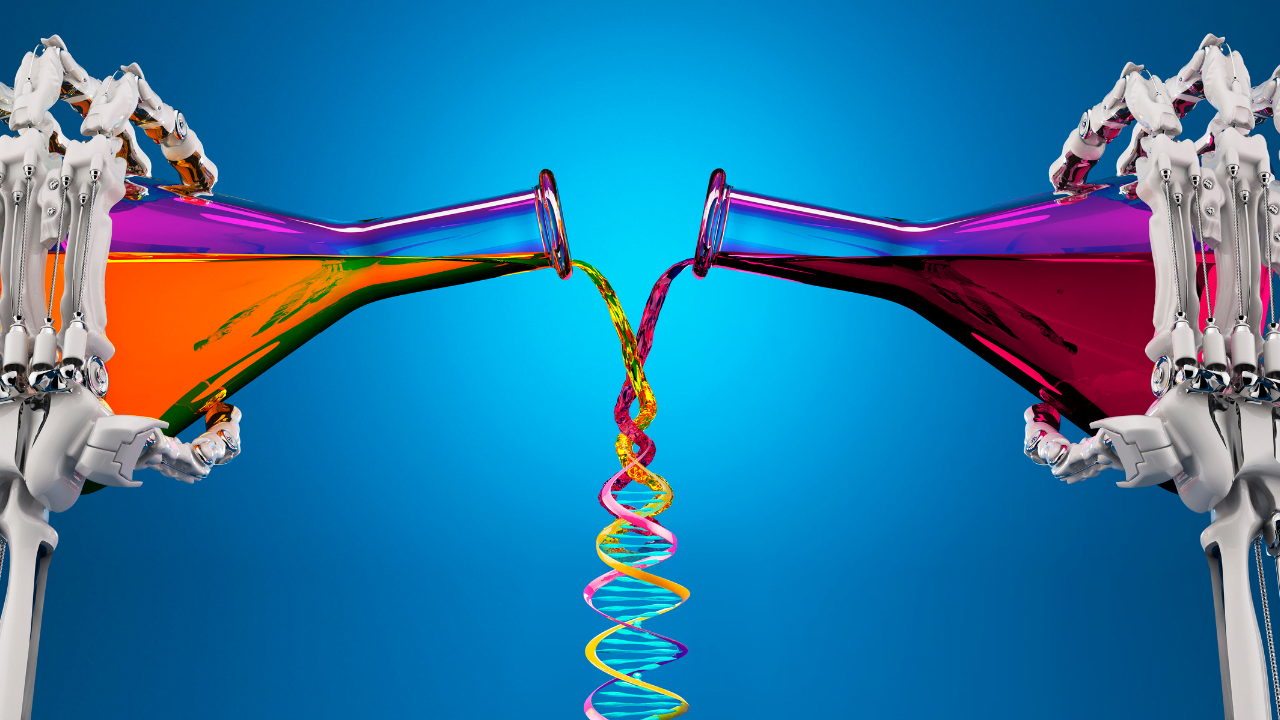No products in the cart.
Christianity and Genetic Engineering: Ethical Considerations in Bioengineering
This post contains paid and/or affiliate links. I make a small commission at no extra cost to you. Please see our Privacy Policy.
The intersection of Christianity and genetic engineering. In this piece, we will explore the ethical considerations surrounding genetic engineering within the context of Christian beliefs and values. As the field of bioengineering continues to advance, Christians need to engage in thoughtful discussions and navigate the complexities presented by genetic interventions.
The Adventist Review article from the Seventh-day Adventist Church provides valuable insights into the Christian perspective on genetic engineering. It highlights ten principles that address the responsible use of genetic engineering and the alleviation of the painful effects of sin through genetic interventions. However, it also acknowledges the complexity of ethical considerations in the rapidly changing field of genetics.
As Christians, we recognize the significance of genetic engineering in altering the fundamental structure of genes in humans and all living organisms. This raises ethical concerns about the impact on the “image of God” in humans and our responsibility to care for the earth and its inhabitants. While genetic engineering presents opportunities to address genetic diseases and restore the human genome, it also challenges us to consider the ethical implications of these interventions carefully.
This article will delve into the ethical concerns in genetic engineering, including the sanctity of human life, protection of human dignity, acceptance of social responsibilities, and safekeeping of God’s creation. By understanding these concerns, Christians can approach genetic interventions with compassion and responsibility, striving to uphold the values of our faith.
Key Takeaways:
- Genetic engineering raises ethical considerations within Christianity.
- Christians must engage in responsible dialogue about the ethical implications of genetic engineering.
- Considerations include the sanctity of human life, protection of human dignity, social responsibilities, and the safekeeping of God’s creation.
- Genetic interventions present opportunities for human well-being but must be approached with care.
- Responsible and compassionate use of genetic engineering aligns with Christian values.
The Impact of Genetic Engineering on Humans and Creation
Genetic engineering has a profound impact on humans and the entire creation. Through genetic mapping, testing, engineering techniques, and eugenic strategies, we can alter the fundamental structure of genes in humans and all living organisms.
However, with this power comes ethical concerns. The advent of genetic engineering raises questions about the impact on the “image of God” in humans and our responsibility to care for the earth and its inhabitants. We are faced with difficult choices regarding the boundaries of genetic interventions and their potential consequences on the sanctity and integrity of life.
On the one hand, genetic engineering presents opportunities for interventions that can restore the human genome to a healthier condition and alleviate the painful results of genetic diseases. This offers hope for individuals and families who have been burdened with the weight of inherited disorders.
On the other hand, ethical concerns surround the modification of genetic traits and the potential for unintended consequences. We must carefully consider the long-term implications of altering our genetic makeup’s natural fabric and its impact on future generations.
Key Points:
- Genetic engineering can alter genes in humans and all living organisms.
- The advent of genetic engineering raises ethical concerns about the “image of God” in humans and our responsibility to care for creation.
- We have the potential to alleviate genetic diseases through genetic interventions.
- We must consider the ethical implications and long-term consequences of altering our genetic makeup.
As we navigate the rapidly advancing field of genetic engineering, we must address these ethical concerns and engage in thoughtful discussions. By doing so, we can ensure that our actions align with our values and promote the well-being of humans and the natural world.
Ethical Concerns in Genetic Engineering
When exploring the field of genetic engineering, it is crucial to address the ethical concerns that arise. These concerns revolve around four main areas: the sanctity of human life, the protection of human dignity, the acceptance of social responsibilities, and the safekeeping of God’s creation.
- Sanctity of Human Life: Genetic engineering raises questions about the value of human life, particularly when it comes to genetically defective individuals. It requires us to deliberate on the ethical implications of altering or manipulating the genetic makeup of a human being.
- Protection of Human Dignity: The ethical considerations in genetic engineering also extend to protecting human dignity. Privacy and confidentiality must be upheld in genetic testing, ensuring that individuals’ genetic information is not exploited or used against them.
- Acceptance of Social Responsibilities: As we engage in genetic engineering, we must consider our social responsibilities. This includes the impact on the gene pool and the potential consequences for society. The decisions we make in genetics should align with our responsibility to promote the well-being of humanity.
- Safekeeping of God’s Creation: Genetic engineering compels us to reflect on our role as stewards of God’s creation. We must exercise caution and responsibility to ensure the preservation and care of the natural order. This includes considering the implications of genetic interventions on life and spiritual development.
Christians must navigate these ethical concerns with wisdom, compassion, and a firm adherence to our faith. By upholding the sanctity of human life, protecting human dignity, embracing our social responsibilities, and safeguarding God’s creation, we can ensure that genetic engineering is approached ethically and responsibly.
The Christian View on Genetic Engineering
The Christian view on genetic engineering encompasses theological concepts such as creation, sin, and the notion that humans are made in the image of God. As followers of Christ, we acknowledge our responsibility to care for the human body and the entirety of God’s creation. However, we also recognize our stewardship’s limitations in this complex genetic engineering field.
There exists a tension between the desire to alleviate the effects of sin through genetic interventions and our understanding that ultimate restoration and redemption are found through faith and trust in Christ. As Christians, we must approach the ethical implications of genetic engineering with a sense of humility, considering responsibility for the consequences and the potential impact on the image of God in each individual and all of humanity.
We understand that the act of creation is sovereign to God alone, and while humanity is called to be responsible stewards of His creation, we must be conscious of our limitations. Genetic engineering demands that we navigate the fine line between our desire to ease human suffering and the intrinsic value of life bestowed upon us.
We must approach genetic engineering with critical discernment, considering our profound responsibility to uphold the sanctity of human life, protect human dignity, fulfill our social responsibilities, and preserve the harmony and balance of God’s creation. The choices we make in this field must align with our faith and honor the principles of Christianity.
By applying these principles, we strive to employ genetic engineering in a manner that respects the divine design inherent in creation while acknowledging the complexities and ethical challenges that arise. We aim to engage in responsible practices that align with God’s will, exuding reverence for creation and a deep sense of responsibility towards the image of God within each individual.
Conclusion
The field of genetic engineering presents Christians with a myriad of ethical considerations in the realm of bioengineering. As we navigate this intersection, we must engage in thoughtful and responsible dialogue regarding genetic interventions’ potential impact and ethical implications.
Our approach to genetic engineering must be guided by a deep understanding of the sanctity of human life, the protection of human dignity, the acceptance of social responsibilities, and the safekeeping of God’s creation. By upholding these ethical principles, we can navigate the complexities of genetic engineering and bioengineering in a manner that aligns with our faith and values.
As Christians, we recognize the immense power and potential of genetic engineering to heal, improve, and alleviate suffering. However, we also acknowledge the limitations of human stewardship and the ultimate restoration that comes through trusting in Christ. Therefore, we must critically evaluate the ethical implications of genetic interventions and approach them with a sense of responsibility and humility.
In conclusion, genetic engineering raises important ethical considerations in bioengineering, particularly for Christians. By engaging in thoughtful dialogue and considering the sanctity of human life, the protection of human dignity, social responsibilities, and the safekeeping of God’s creation, we can navigate this rapidly evolving field in a way that upholds our faith and values.
FAQ
What is genetic engineering?
Genetic engineering refers to altering the fundamental structure of genes in humans and all living organisms. This includes genetic mapping, testing, engineering techniques, and eugenics.
What are the ethical concerns in genetic engineering?
The ethical concerns in genetic engineering can be categorized into four main areas: the sanctity of human life, the protection of human dignity, the acceptance of social responsibilities, and the safekeeping of God’s creation. These concerns include questions about the value of human life when genetically defective, the protection of privacy and confidentiality in genetic testing, the alteration of the human gene pool, and the impact on life and spiritual development.
How do Christians view genetic engineering?
Christians approach genetic engineering by understanding the theological concepts of creation, sin, and humans as created in the image of God. They recognize the responsibility to care for the human body and the rest of creation while acknowledging the limitations of human stewardship. There is a tension between the desire to alleviate the effects of sin through genetic interventions and the recognition that ultimate restoration comes through trusting in Christ.
What are the principles for Christians regarding genetic engineering?
The principles for Christians regarding genetic engineering include a focus on the responsible use of genetic interventions, the alleviation of the painful effects of sin through genetic interventions, and the navigation of ethical concerns with a sense of responsibility and humility.
How should Christians approach genetic engineering?
Christians must engage in thoughtful and responsible dialogue about the potential impact and ethical implications of genetic engineering. It is crucial to approach genetic interventions with an understanding of the sanctity of human life, the protection of human dignity, the acceptance of social responsibilities, and the safekeeping of God’s creation.













